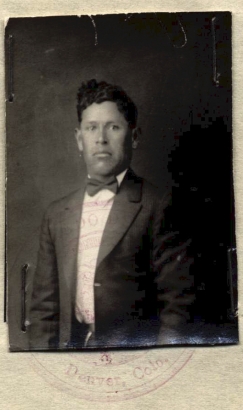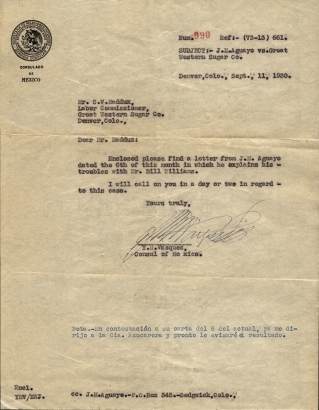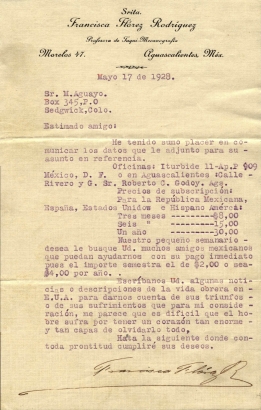Each year, the Denver Public Library receives donations that become part of its Western History and Genealogy collection. In 2008, José Aguayo donated his family papers, aptly named the Aguayo Family Papers (C MSS WH2035), which are organized into three series:
- Museo de las Américas
- personal papers of José Aguayo
- personal papers of Marciano Aguayo, his father
Marciano Aguayo was born circa 1903 in Aguascalientes, Mexico. Around 1917, he followed his older brother Ciriaco to the U.S. and settled in Sedgwick, Colorado, by 1925. He married Jovita Ortega of Chihuahua, Mexico, in 1929, and together they had six children. His younger sister, Daria, remained in Aguascalientes.
In the collection, Marciano’s legacy is highlighted by the correspondence he left behind addressing both professional and personal matters. While few of Marciano’s outgoing letters survive, the collection contains dozens of letters addressed to him from 1925 to 1966.
The bulk of letters were received from the Consulate of Mexico in Denver. Written in Spanish between 1925 and 1944, they document the hard life that Marciano, his family, and fellow Mexicans experienced in rural northeastern Colorado. The letters addressed unfair labor practices, lost wages, mistreatment, and discrimination he and his fellow Mexican braceros encountered while working for The Great Western Sugar Company (C MSS WH1227) and the Union Pacific Railroad Company. Letters from the Railroad Retirement Board and Brotherhood of Maintenance of Way Employees deal with transfers, force reductions, wage issues, displacement from seniority lists, and being called back to work.
Marciano received a letter of congratulations and a $50 savings bond from a Union Pacific vice president when he observed a hotbox on a train and helped stop it. A hotbox is when a railroad car’s axle bearing overheats by friction. The town newspaper also featured a story about his actions. Every few years Marciano also registered for a matrícula consular, or Mexican consulate ID, for himself and his family through the mail.
At a time when illiteracy was high among migrant workers, Marciano wrote letters on behalf of fellow Mexicans. He advocated for better wages and informed the consulate of missing persons, deaths, and asked about repatriation rights to Mexico. His inquiries were timely and addressed real-life concerns in 1920s and 1930s U.S. immigration laws, the risk of deportation, and if foreign nationals could be drafted into World War II military service.
A fair amount of Marciano’s Spanish correspondence was with friends and family in Mexico and the U.S. He corresponded with Daria in Aguascalientes and Ciriaco who went missing for a time, and was later discovered to be living in California. He regularly bought books, newspapers, magazines, and planners from Mexico and became pen pals with the woman who processed his orders by mail. Some of his English correspondence includes nasty letters from a doctor collecting unpaid medical bills, a wristwatch purchase, a Singer sewing machine on a payment plan, and letters from a son in prison.
A few poems Marciano penned also survive, mostly from a Mexican civic celebration and parade in Sedgwick he and his brother organized in 1929. The civic celebrations were funded by dances held throughout the year as fundraisers. The dances were a way for Mexicans to meet one another in northeastern Colorado, and Marciano met his future wife Jovita at one such dance.
In 1934, Marciano was tasked with forming a chapter of the Comisión Honorífica Mexicana, or Honorary Mexican Commission, in Sedgwick. This was a type of honorary consulate and mutual aid society officially sponsored by the Consulate of Mexico in Denver and Mexican federal government. Funds raised benefited members by defraying funeral costs, hospital bills, repatriations, and other expenses in a time and place where few other support systems existed for Mexicans.
In addition to letters, the collection offers additional artifacts, photographs, memorabilia, and primary sources of interest to researchers, genealogists, students, and scholars. More information on the collection is available in the bilingual finding aid (currently in process). Access to the Aguayo Family Papers is open to anybody who would like to consult the collection. No appointment is necessary, however, researchers should note that documents are in both English and Spanish.







Comments
The Aguayo Archive will be a
The Aguayo Archive will be a rich resource for historians writing histories of Mexican immigration and labor in eastern Colorado during the post-revolutionary period of the 1920’s and during the Great Depression and World War II eras.
Thanks for your comment. You
Thanks for your comment. You are right; the collection will be valuable for historians, researchers, and students in the future. As I processed the collection, I realized just how important Marciano’s letters have become over time. Sadly, many of the challenges he and his co-workers faced are the same challenges migrant workers face today.
I hope that you can visit soon and consult the collection yourself.
Today, I had the pleasure of
Today, I had the pleasure of reading your analysis of the Aguayo family papers. I would like to note some changes to the material as follows. Marciano Aguayo was born on November 2, 1897 in Aguascalientes, Mexico and died on December 7, 1979 in Greeley, Colorado. Both he and my mother Jovita became US citizens in 1975. Also, there was a seventh child, Celia, born in 1944. I have some additional material that I would like to donate to DPL, including a novel/memoir that I published in 2019. It is a story loosely based on people with the Aguayo surname from the middle ages in Spain to the present. Could we arrange a meeting, perhaps this summer when the pandemic, hopefully more in control?
Thanks as always for your
Thanks as always for your newsletter. I'd like to let you know that I've just begun a "Colorado Photo History" blog on my website at rupertjenkins.com. I'm hosting it as an outreach for a book project I've been working on for four years and your department and staff have been unfailingly helpful, which I greatly appreciate. I miss you guys and hope you can reopen soon. Please check out the blog. There are also FB and IG sites under the same name. Would you please pass this along to Katie Rudolph - she might be interested in the Myron Wood post especially. Thanks again.
Hello Jose, I am a family
Hello Jose, I am a family member of yours and i am so interested in learning about my family history. My email is amicurry13@gmail.com
In reading again the…
In reading again the information about my father, I am pleased to see your comment about you being a family member and wanting to know more about Aguayo family history. I would like to share with you what I know about our family. Let's begin communicating!
My grandfather Pedro H…
My grandfather Pedro H. Aguayo was borne in Guadalajara, México, migrated to Texas in the 1940’s to the area of McAllen, Texas. My father Pedro Aguayo was borne in Cd. Madero, Tamps. and is 89 years old.
Add new comment